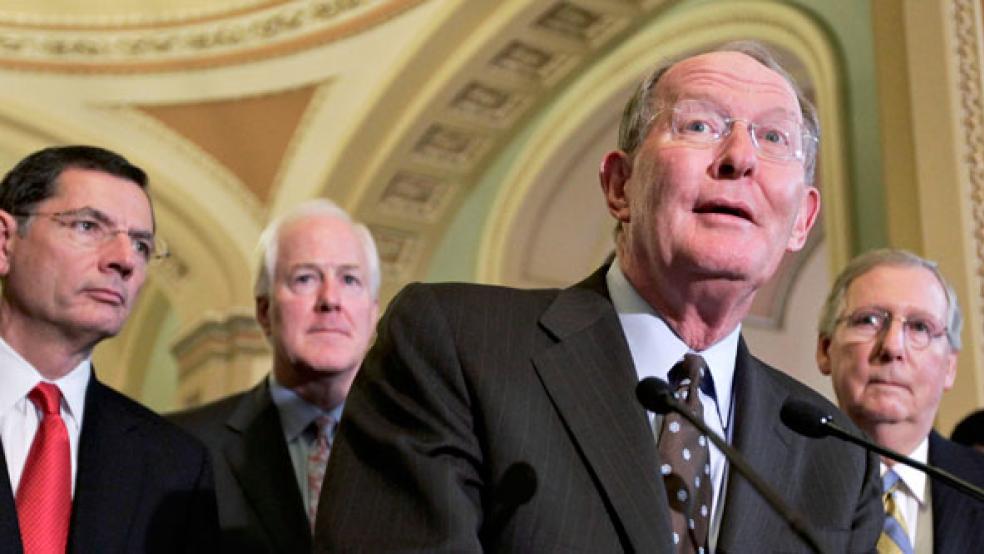Sen. Lamar Alexander says he’s reached a deal with Sen. Patty Murray (D-WA) to fund the Affordable Care Act’s subsidies to insurers, payments that President Trump abruptly cut off last week saying they were illegal without Congressional appropriation. As part of the deal, Congress would also allow states more flexibility on Obamacare insurance plans. The deal reportedly includes:
- Subsidy funding for the rest of 2017 and two more years
- A "copper plan" for people older than 30 that would be less comprehensive, and cost less, than other Obamacare plans
- $106 million in enrollment outreach funding in 2018 and 2019
- Faster reviews for states requesting waivers from some Obamacare requirements
- Funding to help states create reinsurance programs to help reduce costs of coverage for sickest enrollees.
A Short-Term Fix
“This takes care of the next two years,” Alexander said. “After that, we can have a full-fledged debate on where we go long-term on health care.”
Trump said Tuesday the deal is a "good short-term solution” — though he insisted the longer-term fix for the health care system would still involve replacing Obamacare with legislation that calls for federal block grants to the states, along the lines of the Graham-Cassidy bill that failed to muster enough votes in the Senate last month.
Trump on Monday claimed that his decision last week to stop making the cost-sharing reduction (CSR) payments to insurers had sparked a sense of urgency among lawmakers to reach a bipartisan deal to stabilize Obamacare markets. The payments cost about $7 billion this year and help to lower co-payments and deductibles for more than 6 million people. “In my opinion, what’s happening is, as we meet, Republicans are meeting with Democrats because of what I did with the CSR, because I cut off the gravy train,” Trump said. “If I didn't cut the CSRs, they wouldn’t be meeting. They’d be having lunch and enjoying themselves, all right?”
Governing by crisis has become habit in Washington, and Trump, as the self-styled dealmaker-in-chief, may have been looking to secure every bit of leverage he could get. (Though, as many Trump critics quickly noted, talks between Alexander and Murray have been going on for months, and the president’s attempt to take credit came after weeks when he seemed “fully disinterested, if not outright hostile, to the idea,” as Slate’s Jim Newell put it.)
Will It Pass?
But even with Trump’s newfound support, it’s not yet clear whether Alexander and Murray can secure the votes necessary for their deal to pass both chambers of Congress. Republicans may balk at legislation that will be seen as fixing Obamacare rather than repealing it. And some Republicans will be reluctant to agree to payments that they and the president describe as a “bailout” for insurers. Already, Rep. Mark Walker (R-NC), chair of the House's conservative Republican Study Committee, has come out against the deal on those grounds. On the other hand, states that voted for Trump in 2016 will be most hurt by the president’s decision to end the so-called cost-sharing reductions, an Associated Press analysis found, adding to the political risk for Republicans.
At the same time, Democrats may feel less political pressure to agree to a compromise that chips away at Obamacare regulations if they believe that Trump and Republicans now “own” health care, and any problems with Obamacare, in the public’s mind. But Senate Minority Leader Chuck Schumer said the deal and its "anti-sabotage provisions" had broad support in the Democratic caucus.
Even if a bipartisan deal does get passed, it would likely be too late to lower premiums for 2018. Open enrollment begins in just two weeks. Most insurers had already anticipated that the subsidy payments would end and priced their 2018 plans accordingly, though a new analysis from Avalere Health finds that ending the cost-sharing payments could cost insurers more than $1 billion through the end of 2017. Most Obamacare enrollees will be shielded from the higher prices because of federal subsidies.
This article was updated at 5:37 p.m. EDT on Tuesday, October 17.





